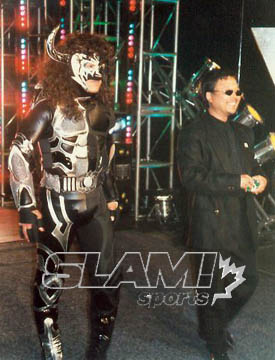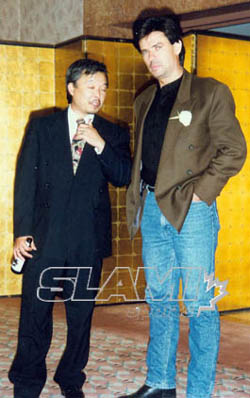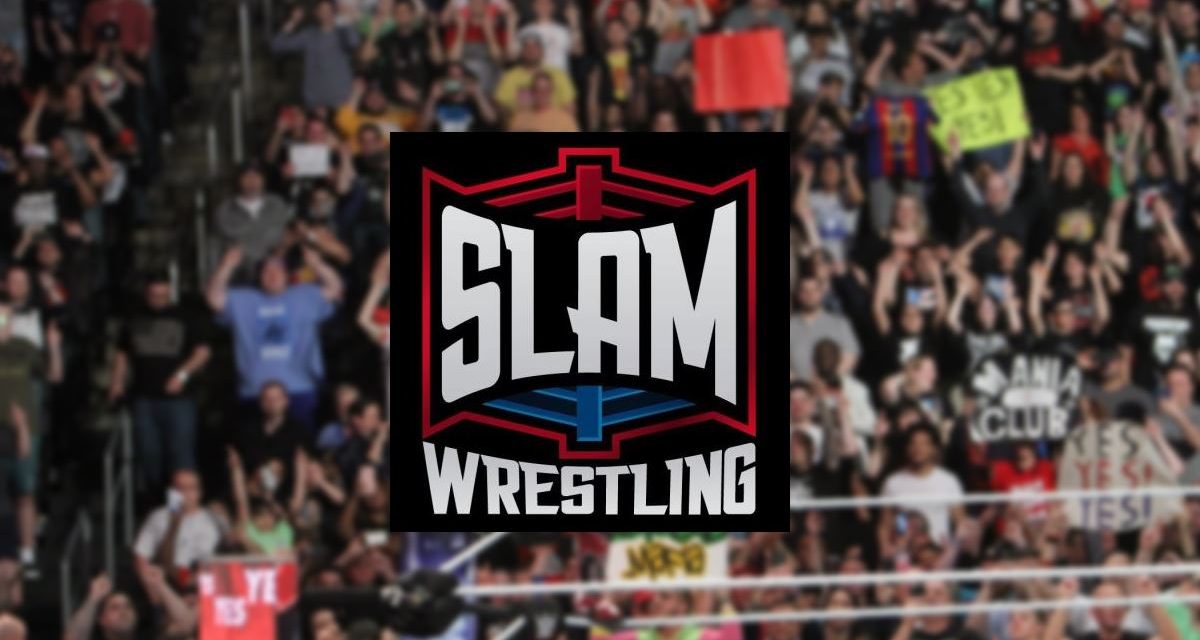Despite all the progress that’s been made over the last century when it comes to equal human rights, racial prejudice may still exist in most professional sports, with wrestling being no exception. Former WCW manager Kazuo “Sonny” Onoo has certainly dealt with his fair share of prejudice.
“Near the end of my tenure in WCW, (Vince) Russo wanted to take all of the Japanese and Mexican wrestlers off TV, because we didn’t carry out his vision and the complaint was about Japanese wrestlers not being associated with American professional wrestling,” Onoo said. “At least that was his view of American wrestling.”

Sonny Onoo accompanies Psychosis to the ring for WCW Nitro action. Photo by Mike Lano, WReaLano@aol.com
Racial prejudice is a topic that is rarely discussed in pro wrestling, because it is highly controversial. The only people who are able to really talk about it are those who have been discriminated against, based on ethnicity. But there are always two sides to every story and what may be perceived by one person as discrimination might be seen by another as playful humour.
Regardless, Onoo only experienced what he considered discrimination in the latter stages of his career. He remembers his early days with WCW as a very pleasurable experience, thanks in part to his close friendship with Eric Bischoff. In fact, Onoo played an important role in the mid ’90s as the international spokesperson, responsible for the huge talent trade between WCW and New Japan Pro Wrestling.
“Eric had nothing to do with us (Japanese wrestlers) being taken off TV,” Onoo said. “He did a great job of bringing in some of the Japanese and Mexican wrestlers, and giving us the TV time.”
Onoo also had the advantage of having a clear command of the English language. He could speak it quite fluently, which was not the case for a lot of other Japanese stars at the time. Because of this, Onoo was well aware of when he was being taken advantage of, or made to look foolish.

Sonny Onoo and Eric Bischoff. Photo by Mike Lano, WReaLano@aol.com
When it comes to developing wrestling characters, it seems like companies will sometimes use specific stereotypes, based on a wrestler’s ethnicity alone. A couple years ago, long-time WWE employee Sho Funaki was given the gimmick of Kung Funaki, complete with karate gi and headband. His last appearance on television was during the 10-year anniversary of Smackdown, where they had him singing karaoke with fellow Japanese star, Yoshi Tatsu. But while some may consider that a stereotype, others may disregard it as entertainment.
Onoo attributes these kinds of gimmicks to the inexperience of the writers when it comes to working with international wrestlers.
“When you grow up in certain counties or specific parts of the country, and live so far away from those countries like Mexico and Japan, and aren’t exposed to that kind of wrestling, you only go with what you know,” Onoo said. “Some of the writers aren’t very imaginative as far as gimmicks go. It’s easy to follow the common stereotypes. But some of them have never worked with international wrestlers, and only write based on their limited experience.”
When Onoo started with WCW, he was amazed by the level of talent that he got to work with, such as Hulk Hogan and Ric Flair. But the Japanese stars soon became highlights of the show. And surely, when people look back at such stars like Jushin “Thunder” Liger, The Great Muta, Masa Hiro Chono and Kensuke Sasake, it will be because of their in-ring talent and not just some stereotype they were attached to.
“It’s almost like wrestling’s a sitcom. A great comedian won’t be funny if the writing is poor and likewise, no matter how talented the wrestler is, his/her performance is dictated by what the writer provides him or her with,” Onoo said.
Whether intentional or not, racial discrimination has existed in pro wrestling just about as far back as the eye can see. But hopefully years from now, when the time capsule opens up and fans take a look back at their favourite international wrestlers, the positive will overpower the negative.
“There is discrimination in this business for a lot of reasons. I’ve never worked for the WWE, but I still have a lot of friends there,” Onoo said. “Rey Mysterio is one of the top stars and he’s doing a good job. He’s pretty entertaining. But a lot of guys don’t get the opportunity to prove themselves, because of the wall created by stereotypes, which could be broken down by open-minded and creative writers.”
And when it comes to the history of Japanese wrestling, there is no doubt that Sonny Onoo will be an integral part of that legacy.
RELATED LINKS
- Apr . 4, 2002: Kazuo ‘Sonny’ Onoo speaks out

